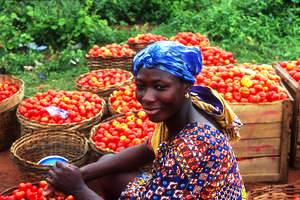38 COUNTRIES "MEET ANTI-HUNGER TARGETS"

ROME-Thirty-eight countries have met "internationally established targets" in the fight against hunger, chalking up successes ahead of a deadline set for 2015, FAO says.
“These countries are leading the way to a better future. They are proof that with strong political will, coordination and cooperation, it is possible to achieve rapid and lasting reductions in hunger,” FAO Director-General José Graziano da Silva said.
Graziano da Silva urged all countries to keep up the momentum, aiming for the complete eradication of hunger, in keeping with the Zero Hunger Challenge launched in 2012 by United Nations Secretary-General Ban Ki-moon.
“Globally, hunger has declined over the past decade, but 870 million people are still undernourished, and millions of others suffer the consequences of vitamin and mineral deficiencies, including child stunting,” the FAO chief said.
“We need to keep up our efforts, until everyone can live healthy, productive lives.”
Success stories
Twenty countries have satisfied Millennium Development Goal (MDG) number one: to decrease the proportion of hungry people by half. Their progress was measured from 1990-1992 and 2010-2012, against benchmarks established by the international community at the UN General Assembly in 2000.
An additional 18 countries were congratulated for reaching both MDG 1 as well as the more stringent World Food Summit (WFS) goal set in 1996 when 180 nations met at FAO headquarters to discuss ways to end hunger. These countries have reduced the absolute number of undernourished people by half between 1990-92 and 2010-2012.
The countries achieving MDG 1 alone were identified as: Algeria, Angola, Bangladesh, Benin, Brazil, Cambodia, Cameroon, Chile, Dominican Republic, Fiji, Honduras, Indonesia, Jordan, Malawi, Maldives, Niger, Nigeria, Panama, Togoand Uruguay.
The countries achieving both MDG 1 and the WFS are: Armenia, Azerbaijan, Cuba, Djibouti, Georgia, Ghana, Guyana, Kuwait, Kyrgyzstan, Nicaragua, Peru, Saint Vincent and the Grenadines, Samoa, Sao Tome and Principe, Thailand, Turkmenistan, Venezuela (Bolivarian Republic of) and Viet Nam.
The countries were honored in a high-level ceremony at FAO headquarters on 16 June, during the week-long meeting of the FAO Conference, the organization’s highest governing body.The ceremony was attended by numerous representatives of FAO member states, including: President Boni Yayi, President of the Republic of Benin; President Mikheil Saakashvili of Georgia; President Porfirio Lobo Sosa of the Republic of Honduras; President Ricardo Martinelli of Panama; President Nicolás Maduro Moros, of the Bolivarian Republic of Venezuela; Prime Minister Samuel A.A. Hinds of the Republic of Guyana; Prime Minister Ralph Gonzalves of Saint Vincent and the Grenadines; Prime Minister Gabriel Arcanjo Ferreira da Costa of the Republic of São Tomé and Principe.
Millions still hungry
According to the State of Food Insecurity in the World 2012, the vast majority of the hungry, 852 million, live in developing countries (constituting around 15 percent of their population) while 16 million undernourished people live in developed countries.
Also, despite the overall downward trend and national successes, hunger has been on the rise in Africa, in recent years.
Globally, food insecurity today is largely a problem of access to the resources or services needed by families to produce, purchase, or otherwise obtain enough nutritious food.
Agriculture plays a pivotal role in providing access to food. More than 70 percent of the poor live in rural areas and most of them depend directly or indirectly on agriculture for their livelihoods. Raising agricultural productivity is therefore an important element in improving access to food.
The FAO Director-General said he was encouraged by signs of increased commitment in many countries to ending hunger and malnutrition through sustainable agriculture and development, including participation in regional programs inspired by the Zero Hunger Challenge.




